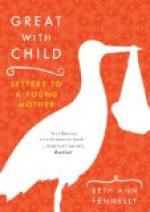SEC. 6. Night Dresses.
As little dress during sleep as possible. No caps. No stockings. Loose night shirt. No tight articles of nightdress. Frequent exchanging of clothes.
SEC. 7. Posture of the Body.
Sleeping on the back—on the sides. Position of the head. The infant’s bedstead. Sir Charles Bell. Darkening the room.
SEC. 8. State of the Mind.
Mental quiet favorable to sleep. Crying to sleep. A good father. All anxiety should be avoided.
SEC. 9. Quality of Sleep.
Soundness of our sleep. Nightmare. How produced. Late reading. Late suppers. Influence of religion on sleep. Different opinions about sleep. Truth midway between extremes. Effect of silence and darkness on our sleep. Of sleep before midnight. Light unfavorable to sleep.
SEC. 10. Quantity.
Infants need to sleep nearly the whole time. Number of hours required for sleep. Opinions of eminent men. The author’s own opinion. Statements of Macnish. Estimates on the loss of time by over-sleeping. Hint to young mothers.
CHAPTER XV. EARLY RISING.
All children naturally early risers. Evils of sitting up late at night. Excitements in the evening. The morning, by its beauties, invites us abroad. Example of parents. Forbidding children to rise early. Keeping them out of the way. Burning them up. “Lecturing” them. What is an early hour?
CHAPTER XVI. HARDENING THE CONSTITUTION.
Mistakes about hardening children. Their clothing. Much cold enfeebles. The Scotch Highlanders. The two extremes equally fatal—over-tenderness and neglect. An interesting anecdote from Dr. Dewees.
CHAPTER XVII. SOCIETY.
Duty of mothers in this matter. Children prefer the society of parents. Importance of other society. Necessity of society. Early diffidence. Selecting companions. Moral effects of society on the young. Parents should play with their children.
CHAPTER XVIII. EMPLOYMENTS.
Influence of mothers over daughters. Anecdote of Benjamin West. Anecdote of a poor mother. Of set lessons and lectures. Daughters under the mother’s eye. Disliking domestic employments. Miserable housewives—not to be wondered at. Mistake of one class of men. Mr. Flint’s opinion.
CHAPTER XIX. EDUCATION OF THE SENSES.
Extent to which the senses can be improved. Case of the blind. The Indians. Julia Brace. Tailors, painters, &c.
SEC. 1. Hearing.
Injury done by caps. Syringing the ears. Anecdote of deafness from neglect. Means of improving the hearing.




